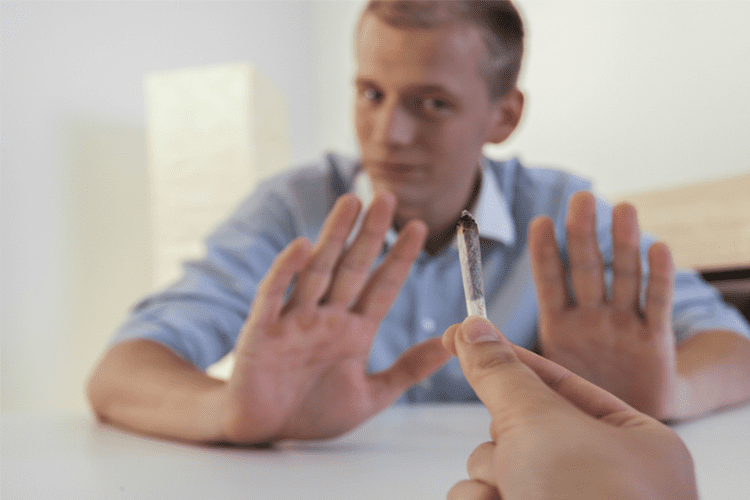Unfortunately, marijuana withdrawal symptoms affect many people with cannabis use disorder (CUD). CUD, also referred to as marijuana use disorder, means that using weed has come to complicate and negatively impact your physical, emotional, or social life. These complications can range from mild to severe. It’s common for people who begin smoking weed early in life and continuously consume it to develop marijuana use disorder.
Often, if people with CUD—or even those who don’t feel their regular marijuana use causes any problems—quit cold turkey, they can experience moderate to intense withdrawal symptoms. Sometimes, symptoms can be so severe that they fall under cannabis withdrawal syndrome (CWS):
- Experiencing THC (the active component in marijuana) cravings
- Feelings of sadness or depression
- Irritation, aggression, or heightened anger
- Insomnia and a decrease in hunger/appetite
- Headaches and nausea
- Anxiety symptoms
Luckily, these symptoms can be managed at home or while attending our intensive outpatient program in North Charleston. While we don’t recommend quitting marijana use without first being enrolled in individual therapy sessions or receiving other supplementary forms of mental health care, it’s possible and non-lethal–albeit uncomfortable–to quit THC cold turkey.
What Are The Best Ways To Cope With Marijuana Withdrawal Symptoms?
One study outlines how people with severe mental health disorders can cope with symptoms associated with quitting cannabis:
- Distract yourself with exercise, hobbies, hanging out with friends, or getting outside.
- Get in touch with family, friends, or peers in your support group to hang out, or grab a coffee or tea.
- Try to build a routine that includes rewarding activities that can take the place of smoking. If, for example, you typically smoke weed first thing in the morning—replace that activity with a walk, stretching, or eating a small piece of something sweet.
- Avoid places where marijuana is present or being consumed until you have a better handle on sobriety.
- If possible, limit or entirely avoid time with people who will smoke in front of or near you.
- Try to find and engage in activities that help you feel relaxed and emotionally regulated.
Waypoint also offers a wide range of support for you or your family members trying to cut weed out of their daily lives, such as experiential therapy and continuing care and recovery education programs.
How Does Cannabis Use Disorder Develop?
People consume marijuana and products derived from it for a variety of reasons. Pain management, anxiety symptom reduction, recreation, and even to curb cravings for other drugs like cocaine, heroin, or alcohol. While many people are under the impression that weed is all natural and non-habit-forming, the truth is that any substance or behavior can become addictive. If you or someone you love uses marijuana daily or almost every day, certain parts of the brain start to rely on the psychoactive chemicals that cannabis carries into the body.
These psychoactive chemicals are called cannabinoids, and the body naturally creates them itself—just in much lower doses than marijuana. According to the University of South Carolina, the body’s cannabinoids perform a few essential tasks for us:
- Help regulate sleep, mood, and appetite functions
- Boost creative mechanisms like learning, as well as memory storage
- Play a role in fertility and body temperature
- Impact pain and immune functions
- Support relaxation when the mind and body are stressed
When someone habitually smokes or ingests marijuana over a sustained period (months, years, or more), the body may stop making its biological cannabinoids because they’re being imported into the body externally. As a result, you may struggle to feel normal or relaxed if you suddenly can’t smoke weed. This is the first sign that CUD has developed.
Receive Support For Marijuana Withdrawal at Waypoint Recovery Center
At Waypoint, we understand the essential science behind marijuana dependency: it’s real, it can create uncomfortable withdrawal symptoms, and it’s natural to need support when managing those symptoms.
THC withdrawal lasts anywhere from a few days to several months, and we’re here at our outpatient center to guide you and offer resources every step of the way. If you’re currently supporting a partner, friend, or family member who is weaning off or quitting weed cold turkey, remember to be patient with them as they experience mood swings or depression symptoms. If you need advice on how to proceed or be a better resource for them, don’t hesitate to get in touch today!





